Dental Implants — Richardson, TX
The Next Best Thing to Natural Teeth
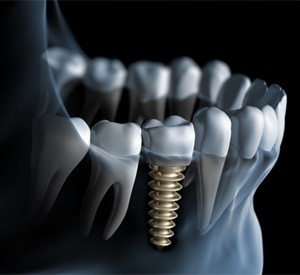
Dental implants are small posts that resemble screws. When inserted into the area where a missing tooth once was, these implant posts fuse with natural gum and bone tissue. This allows them to seamlessly mimic the lost root structures of missing teeth. At EPO Dental Specialists, we can use dental implants to help our patients replace any number of missing teeth. If you’ve lost a single tooth or a full arch of teeth, contact our office to schedule a dental implant consultation. Our periodontal specialist, Dr. Yaritza Vazquez , has advanced training in the surgical placement of dental implant posts and can provide safe, effective treatment in our Richardson, TX practice.
Why Choose EPO Dental Specialists For Dental Implants?
- #1 Start-to-Finish Dental Implant Treatment
- #2 Highly Experienced Specialists with Years of Advanced Training
- #3 Permanently Replace Any Number of Missing Teeth
What Are Dental Implants?
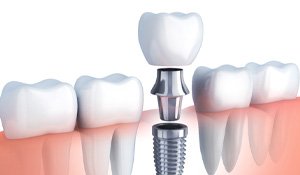
Implants are small, titanium posts that are inserted into the mouth where a missing tooth once was. They offer a strong and natural support structure for a replacement tooth or teeth so they look, feel, and function just like healthy teeth. Unlike other tooth replacement options like dentures or dental bridges that restore missing teeth above the gum line, patients who receive dental implant-supported tooth replacements experience significant improvements in chewing ability, comfort, appearance, long-term well-being, and more. Overall, dental implants are widely considered by patients and specialists alike to be the next best thing to natural teeth.
The 4-Step Dental Implant Process

Dental implants are intended to last for several decades or even the rest of your life! To ensure the best possible chance of success, implants require a unique, multi-step process that takes several months to complete. At EPO Dental Specialists, we are proud to complete the entire dental implant process at our practice. Our periodontal specialist, Dr. Yaritza Vazquez, has advanced training in the surgical placement of dental implants. Each patient’s treatment looks a little bit different, but here are the four main steps you can expect.
Initial Dental Implant Consultation

The first step in getting dental implants is to attend a consultation. During this time, we will go over your medical history and oral health to ensure that dental implants are the right option for you. If necessary, we will work with you to complete preliminary procedures, like gum disease therapy, tooth extractions, or bone grafting. Then, we will move on to plan the rest of your dental implant treatment. During your consultation, we will discuss the timeline of your treatment and the cost so you don’t have any surprises.
Dental Implant Surgery

We are proud to complete the entire dental implant process in-house, so you don’t need to worry about working with a local specialist. We will begin by numbing the area with a local anesthetic to ensure that you are comfortable throughout the entire process. Then, an incision is made into the gum tissue so the implant posts can be placed. Lastly, the gums are closed and protective caps are placed over the dental implant posts.
Dental Implant Osseointegration & Abutment Placement
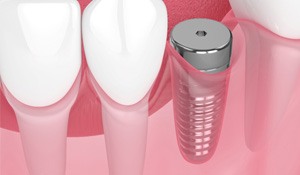
Over the next three to six months, your dental implants will fuse to your jawbone in a process called “osseointegration.” Then, we will secure small metal connectors, called abutments, onto the implants. This will allow your final restoration to clip onto them. Impressions are made so your crown, bridge, or denture can be perfectly crafted to fit and match the rest of your smile.
Delivery of Dental Implant Restorations
Lastly, you will return to the dental offer so your custom-crafted replacement teeth can be placed. During this visit, we will check to make sure that your bite is lined up and everything is comfortable. Then, you can experience all of the benefits of your new and improved smile!
Delivery of Dental Implant Restorations

Lastly, you will return to the dental offer so your custom-crafted replacement teeth can be placed. During this visit, we will check to make sure that your bite is lined up and everything is comfortable. Then, you can experience all of the benefits of your new and improved smile!
Benefits of Dental Implants

In all honesty, dental implants are the gold standard of tooth replacement. They’re so well-regarded that dentists place over 500,000 of them yearly! Still, this much is natural – implants’ unique placement gives them perks you won’t find with other restorations. As a result, these prosthetic teeth can dramatically improve your quality of life. If you’d like further details, we at EPO Dental Specialists will happily tell you more. Just keep reading or call our office for the facts.
Day-to-Day Benefits

As you’d expect, the most apparent implant benefits are the day-to-day ones. You’ll notice them soon after treatment is done. In particular, they include:
- A Beautiful Smile – Due to using high-quality porcelain, implants look beautiful and blend seamlessly with surrounding teeth. They’ll thus enhance your grin’s looks. In fact, your peers likely won’t tell them apart from natural teeth.
- A Confidence Boost – Since implants restore your smile, they typically boost your confidence and body image. You’ll then feel more at ease in social situations.
- Better Chewing Ability – Remember, implants fuse with your jawbone over time. That means they stay secure and strengthen your bite force. From there, they’ll allow you to chew and eat your favorite foods!
- Easy Maintenance – Unlike dentures or bridges, implants are easy to maintain. You simply need to clean them as you would natural teeth. In particular, just brush them twice daily and floss them once daily. Add in some mouthwash, too, and they’ll last a good while.
Health Benefits

Implants’ advantages also extend to your physical health. As such, you can expect treatment to give you a stronger body. The specific health perks are:
- A Stronger Jawbone – Left unchecked, tooth loss will erode your jaw. You’ll then suffer facial collapse – a condition that greatly ages your face. Luckily, however, implants prevent and even reverse this erosion. They stimulate your jawbone and maintain its bone density.
- Support for Natural Teeth – Besides being unseemly, smile gaps can make your other pearly whites tilt and fall out. That said, implants can fill those spaces, reducing the odds of further tooth loss.
- Fewer Oral Issues – Because implants are easy to clean, getting them often improves a patient’s oral health. Your new teeth will then lower your risk of cavities, gum disease, and similar issues.
Long-term Benefits

Of course, what really sets implants apart are their long-term benefits. These upsides make treatment a great investment. Consider, for instance, those listed below:
- High Success Rate – When placed by a qualified dentist, implants are successful for a long time. Their ten-year success rate even sits at over 95%.
- Little-to-No Replacement – Implants’ average lifespan is 15-20 years, which can be further extended with proper care. As such, they need to be replaced as often as other restorations.
- Save Money – Given their lifespan (see above), implants save you money in the long run. In contrast, bridges and implants only last five to seven years. Consequently, they need frequent (and pricy) repairs and replacements.
Who Dental Implants Can Help

During your oral and overall health evaluation, we’ll carefully examine your smile, capture X-rays, and partner with you to determine whether or not you are a viable candidate for dental implants. We’ll discuss your health history, any past surgeries, and explain the time and financial commitment involved in getting dental implants. This may include an evaluation of your dental or medical insurance coverage. If you ever have questions or concerns about the treatment, please let us know right away. Our skilled periodontist will be happy to walk you through even the most intricate parts of your procedures.
Who Is a Good Candidate for Dental Implants?

Pretty much any healthy adult can get dental implants. Typically, you will need to meet the following requirements to make a good candidate:
- Good Overall Health: Placing dental implants is a surgical procedure. You need to be well enough to undergo minor surgery.
- Great Oral Health: Issues like cavities and gum disease can potentially cause dental implants to fail. Any oral health issues will need to be addressed first.
- Adequate Jawbone: It’s essential that your jawbone is strong enough to support dental implants for your treatment to be successful.
If you don’t make a good candidate for dental implants initially, you may still be able to get them in the future. Many patients need to complete preliminary treatments, like tooth extractions, gum disease treatment, or bone grafting, before getting dental implants. We can help you to schedule these preparatory procedures to get you on track. Once you are a good candidate, we can move forward in the dental implant process.
Missing One Tooth
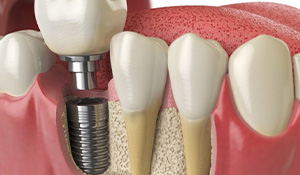
A single dental implant post and a crown can replace one missing tooth. This is a sturdy, long-lasting solution. Unlike a dental bridge, a dental implant doesn’t require the removal of healthy enamel from the adjacent teeth.
Missing Multiple Teeth
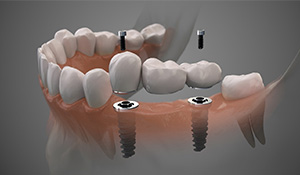
If your missing teeth are consecutive, two dental implant posts can support a dental bridge to fill in the gap. An implant bridge does not rely on healthy adjacent teeth like a traditional bridge does. For multiple missing teeth throughout the mouth, several implants can be used to anchor a partial denture in place.
Missing All Teeth
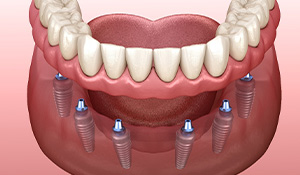
If you are missing all of your natural teeth, dental implants may be an option for you too. Four to six strategically placed dental implants can be placed on each arch to support a full denture. This allows for much more stability than you can achieve with traditional dentures.
Alternatively, you may be a good candidate for All-on-4 dental implants. This method is ideal for patients with inadequate jawbone density due to tooth loss. As the name implies, this option anchors a full denture surgically in place with just four strategically placed dental implants.
Understanding the Cost of Dental Implants

As remarkable as dental implants are, many people hesitate to commit to them because they are worried about the price of this procedure. Indeed, each step in the treatment process, from preparatory work to restoration, may come with a significant cost. But implants are more than worth the money! Furthermore, you may be surprised by how easy it is to fit this life-changing procedure into your budget when you take advantage of insurance and low-interest financing.
How Much Dental Implants Cost

It’s impossible to give a generalized estimate of how much dental implants in Richardson cost because every patient’s mouth is unique. There are a number of factors that go into determining the amount of the final bill, including:
- Preliminary work . Some patients require extractions or gum disease treatment before they can receive implants. Others may require a bone graft or sinus lift.
- The number and type of implants received . Logically, more implants your periodontist in Richardson has to place, the more your procedure will cost.
- The restoration . The materials used to make your artificial teeth, as well as the number of teeth that the restoration is replacing, will affect the total price of the treatment.
When you attend your consultation in our office, our staff can give you a concrete idea of how much your treatment will cost.
Keys to Affording Dental Implants

Although implants do cost quite a bit of money, many patients are surprised by how easy they are to afford. Here are a few resources you may be able to use to fit your new smile into your budget:
- Dental insurance . More and more dental insurance plans are changing their policies to cover implants. Even if your insurance doesn’t cover implants, however, it may still help with the cost of extractions, gum disease treatment, and/or your prosthetic teeth.
- Flexible Financing. Our office partners with CareCredit, which provides low- or no-interest financing for dental treatments.
Are Dental Implants A Worthwhile Investment?

Are implants really worth all that money? Yes! Since they have the potential to last a lifetime, you’ll never have to worry about replacing them. That is in contrast to other tooth replacement options, which may fail after 5 – 10 years or so. Also, since implants help to preserve the jawbone and provide an extremely strong bite and natural appearance, the practical benefits they provide offer unquantifiable value.
To learn more about dental implants or to get started on exploring your options for paying for this procedure, get in touch with our friendly team today.
Advanced Dental Implant Procedures
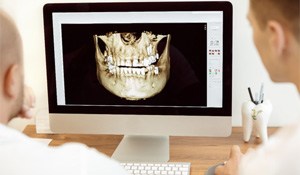
It is essential for a patient’s mouth to be healthy in order to get dental implants. Additionally, the jawbone needs to have adequate density to successfully support the replacement teeth. As tooth loss naturally results in bone reabsorption, these factors can often be a hinderance for patients who would otherwise be excellent dental implant candidates.
Fortunately, we offer a variety of advanced dental implant procedures that can help you become eligible for a successful dental implant treatment. During your initial consultation, we will closely evaluate the imaging of your mouth to determine if you need any of these services before moving forward with dental implants. Depending on your unique situation, you may need a bone graft, a sinus lift, ridge expansion, jawbone regeneration, or nerve repositioning. We also offer ridge preservation to support the jawbone and surrounding oral structures once a tooth or teeth have been lost.
Learn More About Advanced Dental Implant Procedures
Learn More About Bone Regeneration
Learn More About Ridge Preservation
Dental Implant Failure & Salvage
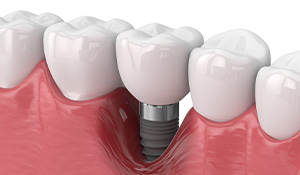
No dental treatment is completely free of risks, and dental implant placement is no exception. On rare occasions, dental implant posts can fail, and swift action is often required if you want to protect your oral health. Get in touch with our team immediately if you’re worried about the state of your dental implant; the sooner you get to our office, the sooner we can start figuring out your options for salvage.
Learn More About Dental Implant Failure & Salvage
Dental Implant Post-Op Instructions

Once your dental implants have been surgically placed, you’ll need to follow a set of post-op instructions. Not only will these guidelines help you stay comfortable while you heal and speed up the process, but they will maximize your chance of enjoying long-term success.
Maintaining & Caring for Your Dental Implants

With proper care, dental implants will last two or more decades without the need for repair or replacement. In fact, many patients are able to maintain their implant-supported tooth replacement for the rest of their lives! What can you do to help your new smile stand the test of time? Read on below to discover some helpful tips for dental implant maintenance.
Make Oral Hygiene a Priority

Your dental implants cannot develop cavities, but they can accumulate plaque. Even worse, bacteria can sneak into the surrounding tissue and cause a dangerous infection. Fortunately, such issues are usually easy to prevent via thorough oral hygiene. Be sure to gently brush your teeth twice each day; pay special attention to the area along your gumline. Daily flossing and the use of an antibacterial mouth rinse may also be beneficial.
Eat a Healthy Diet

Dental implants can enable you to eat whatever you want, so feel free to enjoy all of your favorite snacks and meals. However, keep in mind that, just like natural teeth, some foods are better for dental implants than others. Try to minimize your intake of hard, sticky, and sugary foods. Instead, center your diet on items that are rich in nutrients that support oral health. Things like dairy products, fresh vegetables, and lean proteins can all be great choices.
Break Bad Habits

Bad habits have the potential to damage your implants or even cause them to fail altogether. If you do any of the following, you should make every effort to stop:
- Smoke or use chewing tobacco. Any tobacco or nicotine-containing products can increase the risk of oral infections.
- Chewing on hard objects. Biting down on ice, pen caps, or other hard items can damage your implant restorations.
- Using your teeth as tools. Instead of using your teeth to open packages or trim your fingernails, use tools that are designed specifically for what you are trying to accomplish.
Protect Your Dental Implants
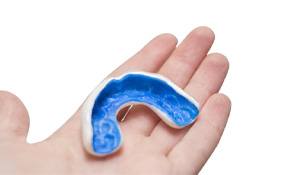
If you play sports, you should protect your dental implants by wearing a mouthguard during practice and games. Keep in mind that custom mouthguards from a dentist provide better protection than any that you can purchase over the counter.
If you tend to grind and clench your teeth at night, you may need a different kind of mouthguard — one that is designed to place a barrier between your upper and lower teeth with the goal of protecting them from each other.
Schedule Regular Dental Checkups

Even if you no longer have any of your natural teeth, it will remain important for you to visit your general dentist twice a year for a cleaning and checkup. They will remove your restorations, thoroughly clean your implants, and inspect your mouth for any signs of infection or other problems. Hopefully, they will be able to catch and treat any developing issues before they pose a serious threat to your oral health.
Dental Implant Technology

Our talented team of dental specialists use all of their knowledge and skill to help patients enjoy successful dental implant treatment. However, they could not do what they do without the assistance of advanced technology. What are some of the instruments and techniques that our team uses to make your treatment experience as pleasant and low-risk as possible? Here are a few examples:
CBCT Scanner
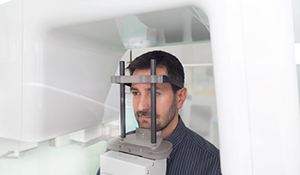
A CBCT scanner may also be called a 3D cone beam scanner or a 3D CT scanner. However you refer to it, the Cone Beam Computed Tomography technology that we use can play a pivotal role in your dental implant treatment process. This machine uses a cone-shaped beam of radiation to produce an extremely detailed, three-dimensional digital image of your jawbone, teeth, nerves, and connective tissues.
We often use the CBCT scanner during the treatment planning stage of dental implant tooth replacement. We may also use it to monitor osseointegration after the implants are in place. If you ever develop a problem with your dental implants in the future, the scanner may be able to help us identify the nature of the issue and recommend a solution.
Guided Dental Implant Surgery

Essentially, there are two ways to perform dental implant surgery. Many practitioners only do freehand placement. Basically, they take a well-educated guess as to exactly where, at what angle, and how deep the implants should be inserted into the jawbone. Freehand placement is often successful, particularly in simple and straightforward cases.
However, guided dental implant surgery can minimize the risk of human error. Prior to your procedure, we work with a dental laboratory to create a custom surgical guide. It helps us place the implants exactly where they need to go. It can reduce the risk of implant failure and contribute to a shorter recovery time after the procedure.
Antibacterial Coating

Infection is one of the leading causes of dental implant failure. It occurs when bacteria attack the tissue around an implant and damage it, causing the implant to lose its base of support. Thorough oral hygiene is key for reducing the risk of such an infection. However, an antibacterial coating on the implants themselves is also helpful. The coating can help to kill harmful bacteria and keep your smile as healthy as possible.
Digital Impression System
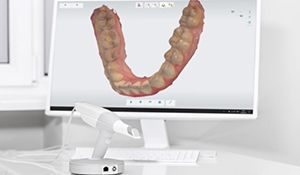
When the time comes for us to restore your dental implants with a beautiful crown, bridge, or denture, we will use our advanced digital impression system. Instead of asking you to bite down on an unpleasant putty material, we simply move a small wand-like device around your mouth. It can capture thousands of images of your teeth and jaw and work with high-tech software assemble them into a digital representation of your mouth. We can then use that impression as the basis for designing your new teeth.
Digital Impressions are incredibly accurate and can play a big role in helping us to ensure that your restored smile is as attractive and functional as possible.
Dental Implant FAQs

If you’re considering an advanced dental treatment like dental implant-supported tooth replacement, the EPO Dental Specialists team members know you’ll have a lot of questions. Our caring dental specialists and team are always happy to talk to you about your concerns, treatment options, and questions. Whether you’re in our office for a dental appointment or call on the phone, one of our knowledgeable team members will be happy to help. If we don’t know the answer to your questions, we’ll find it and get back in touch with you quickly. Below, you’ll find the answers to some of the questions we hear most often from patients planning for dental implant tooth replacement. If you don’t see the question you’re looking for, please give our caring Richardson dentistry team a call today. We’ll be happy to help.
How Many Dental Implants Do I Need?
The number of dental implants you need will depend on how many missing teeth you have. In most cases, we recommend the following:
- Replacing one individual tooth or two consecutive teeth is often accomplished with a single dental implant and a dental crown (or two dental crowns fused together).
- Three or four consecutive missing teeth will typically be replaced with a dental bridge that is supported by two dental implants on either side.
- Replacing multiple missing teeth throughout the mouth with a partial implant denture or an entire arch of missing teeth with a full implant denture may take anywhere from three to six dental implants.
How Long Does The Dental Implant Tooth Replacement Process Take?
The implant placement and tooth replacement restoration can take several months to a year or longer to complete. The majority of this time will be spent simply waiting and monitoring the implant posts as they fuse with the supportive tooth structures. You will only need to visit our office for a few treatment appointments.
How Much Do Dental Implants Cost?
The cost of your dental implant restoration will vary greatly depending on a variety of factors, including, the implant material, the number and placement of missing teeth, the need for preparatory treatments, and more. We will walk you through costs associated with your particular treatment plan, dental insurance coverage, and other factors that may impact the cost of your dental care. Before we get started with your implant-supported tooth replacement plan, we’ll be happy to help you budget for your treatment.
What Are Dental Implants Made Of?
Dental implant posts are available in a variety of materials that each have advantages and disadvantages. The longest used is titanium, and this material has been utilized in tooth replacement and bone repairs for decades. You can also receive dental implants crafted from a variety of materials, including metal-free zirconia.
More to Explore
Endodontics Periodontal Care Orthodontics View All Our Services
